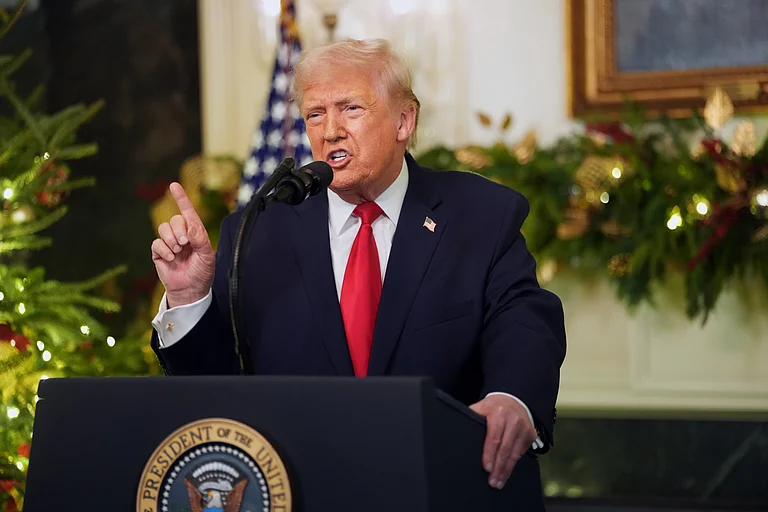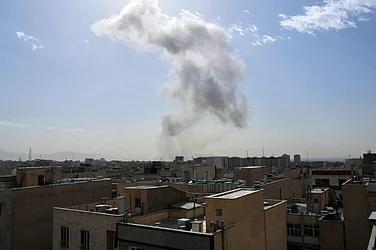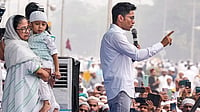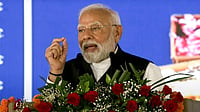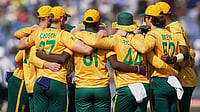Pakistan's newly-elected lawmakers were sworn in on Thursday during Parliament's maiden session after President Dr Arif Alvi summoned the National Assembly after delaying the process for several days.
The National Assembly was summoned after Alvi's initial refusal due to differences with the caretaker government over the issue of former prime minister Imran Khan's party-backed candidates being allotted the reserved seats.
The opening session of the 16th Parliament, headed by the outgoing Speaker of the previous Parliament, Raja Pervaiz Ashraf, began after a delay of more than an hour.
Ashraf administered the oath to the newly-elected lawmakers amidst unruly scenes as 71-year-old Khan's Pakistan Tehreek-e-Insaf (PTI)-backed lawmakers chanted slogans against alleged vote rigging in the February 8 general elections.
After the oath-taking, the lawmakers signed the register roll of the National Assembly to officially become members.
The new oath-taking lawmakers included the Pakistan Muslim League-Nawaz (PML-N) supremo Nawaz Sharif, PML-N President Shehbaz Sharif, Pakistan Peoples Party (PPP) Co-chairman Asif Zardari and PPP Chairman Bilawal Bhutto-Zardari.
Early on Thursday, Alvi approved a move from the caretaker parliamentary affairs ministry to summon the newly-elected National Assembly's first session on February 29, according to a statement posted by the president's X account.
"Subject to some reservations, President Dr Arif Alvi has summoned to convene the National Assembly on February 29 in exercise of the powers conferred by Article 54(1) of the Constitution of the Islamic Republic of Pakistan," the statement said.
It said that the president accorded his approval keeping in view "the mandate and implications of the timeline given in Article 91 (2) and subject to some reservations and expecting the resolution of the issue of the reserved seats before the 21st day [after the general elections]."
The late-night statement also took issue with the tone of the summary sent to Alvi by the caretaker Prime Minister Anwaar-ul-Haq Kakar, adding that the president was calling the session as he expected that the issue of reserved seats would be settled by the 21st day after the polls, as envisaged in the law.
According to constitutional provisions, the meeting of the National Assembly must be convened within 21 days of the elections, and February 29 is the mandated date under Article 91.
The newly-elected National Assembly will elect the new speaker and deputy speaker.
The election for the post of prime minister is expected on Saturday, and former premier Shehbaz Sharif is poised to be elected as the new leader of the House under a post-election deal between the PML-N and the PPP.
On Monday, Alvi, a close aide of jailed former prime minister Imran Khan and a former senior member of his party, rejected a move from the caretaker parliamentary affairs ministry to summon the National Assembly's first session, maintaining that all reserved seats be allocated before its summoning.
Winning independent candidates of former-cricketer-turned-politician Khan's PTI joined the rightwing Sunni Ittehad Council (SIC) to receive the party's share of reserved seats for women and minorities in the national and provincial assemblies.
Candidates of the PTI fought as independents after the party could not directly participate in the February 8 elections due to the non-allotment of its iconic electoral symbol - the cricket bat.
A five-member bench of the Election Commission of Pakistan began the open hearing on the SIC's plea seeking allocation of reserved seats and the counter-pleas filed against it earlier this week.
The House was already meeting at 10 am on Thursday as National Assembly outgoing Speaker Ashraf decided to convene the lower house of parliament session after Alvi's denial.
Alvi's statement said that returning the move for a National Assembly session was “very much in accordance with the provisions of Article 48(1)” of the Constitution.
“It is not understood on what grounds it has been taken as a partisan act, though it was also aimed at the completion of the National Assembly in accordance with Article 51 of the Constitution,” it said.
Alvi’s decision not to summon the session was heavily criticised by the PML-N and the PPP parties, whose leaders on Tuesday warned that it might lead to "legal consequences".
The PTI had alleged massive rigging in the election and vowed to raise their voice inside and outside the Parliament.
The PTI-backed independents won majority seats at the 266-member National Assembly in the February 8 general election.
However, the PML-N and the PPP have agreed on a power-sharing deal to form a new coalition government, which may effectively end Khan's chances of returning to power.
Khan's party has rejected the attempts by the PML-N and the PPP to form a coalition government, warning that robbing its public endorsement by the "mandate thieves" will result in the worst political instability.
Independent candidates - a majority backed by the PTI party -- won 93 National Assembly seats.
The PML-N won 75 seats, while the PPP came third with 54 seats. The Muttahida Qaumi Movement Pakistan (MQM-P) has 17 seats.







